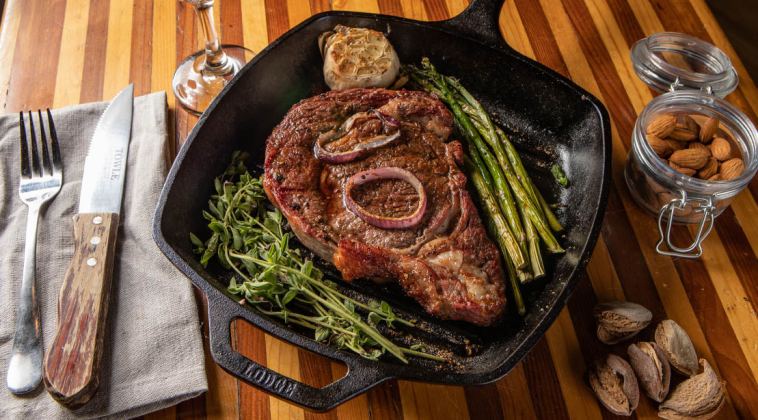- Like
- SHARE
- Digg
- Del
- Tumblr
- VKontakte
- Flattr
- Buffer
- Love This
- Save
- Odnoklassniki
- Meneame
- Blogger
- Amazon
- Yahoo Mail
- Gmail
- AOL
- Newsvine
- HackerNews
- Evernote
- MySpace
- Mail.ru
- Viadeo
- Line
- Comments
- Yummly
- SMS
- Viber
- Telegram
- JOIN
- Skype
- Facebook Messenger
- Kakao
- LiveJournal
- Yammer
- Edgar
- Fintel
- Mix
- Instapaper
- Copy Link
Once you’ve picked a great cut of steak, which grilling expert and author of “The Provider Life Cookbook” Chad Belding helped you select in his previous story, it’s time to cook it, reverse-sear style!
Grilling the perfect steak isn’t a long process, but it is a precise one. Temperature, time, seasoning, and cooking tools matter, and Belding walks you through it all with the following four-step process. This grilling recipe is a little different than most. Most people sear the steak first, but Belding prefers to reverse sear it to give it a nice outer bark and keep it tender and juicy.
Give this recipe a try, and you’ll never sear the same again!
Chad Belding’s guide to a reverse-sear steak
You’ll needed: Grill, dry rub, meat thermometer, cast iron skillet, tongs. (See below for specific product recommendations from Belding.)
Step 1: Apply the dry rub
Grab your thawed out steak from the refrigerator and your favorite dry rub, and thoroughly massage the seasoning into the meat. This step is critical for maximizing flavor. Belding has his own line of 10 different rubs at TheProviderLife.com.
“Whether we’re talking steak, beef, or wild game, I wholeheartedly believe in dry rub,” says Belding. “That dry rub is able to penetrate the steak and get into the pores and really get good flavor through the resting process and cooking process. Thoroughly rub that dry rub into every square inch of that steak. I like to use the Crosshairs rub from Provider Life and mix it with Drop Tine.”
Step 2: Preheat the grill to 300ºF while letting the steak rest
Belding makes sure to let the steak sit at room temperature for 15 to 20 minutes before cooking. During that time, he heats the grill to 300ºF — no more than that. If this doesn’t sound hot enough to you, it’s probably because you’re thinking of a traditional sear, in which the steak is subjected to the highest temperatures first, often using a cast-iron skillet. Don’t worry, you’ll use the skillet, just on the backend.
“A lot of people think you should sear before you grill,” says Belding. “I learned through Chad Ward at Whiskey Bent BBQ of what we call reverse searing, where you sear at the end. That reverse sear is going to give you a really good, aesthetic-looking steak that has the grill marks and the bark on it. It’s not soft and soggy – it’s a steak.”
Step 3: Cook the steak on the grill to 122ºF and prep the cast-iron skillet
Throw the steak on the pre-heated grill, and get the cast-iron skillet ready (either on your stove in the house or on your grill if you have that setup) for when you take the meat off the grill. Using your meat thermometer, grill the steak until it reaches 122ºF, then remove it and transfer to the heated skillet.
Step 4: Sear the steak in the cast iron skillet, let it rest, then enjoy
“Sear it for 2 minutes on each side,” says Belding. “The internal temperature’s going to reach about 130 to 131 degrees. Take it off of that reverse sear heat, let it sit for 10 minutes at room temperature, then slice it against the grain. It’s going to be about 132º to 133º, medium-rare internal temperature, and a perfect raspberry reddish color on the inside. You’ll also have that really nice bark and char on the outside, where you taste some of that smoke, you taste those dry rubs, you taste those juices, you taste some of that fat, and it’s the perfectly cooked steak.”
Side items with your steak
What to eat with your steak? Belding prefers a low-starch, low-sugar diet for staying lean and promoting optimal health, so any type of vegetable is a good choice.
“If you’re in an exercise mindset and you’re keeping your sugars and carbs low, go with some asparagus and maybe a sweet potato,” he says. “But you don’t need to go real heavy on noodles and white rices or anything like that to have an enjoyable experience with this type of steak.”
If you want to drink with your steak, enjoy a glass wine or some whiskey. “There’s a lot of great Merlots, Cabernets, and Pinot noirs that pair really well with steak,” says Belding. “A good whiskey would work, too. A high-proof single-barrel style, Tennessee sour mash whiskey goes very well with beef.”
5 tools every fit guy needs for grilling
Belding explains why these items are a must-have for any grilling enthusiast.
Traeger Grill
“Traeger grills are amazing for cooking steaks. They’re wood pellet grills, so you have a hopper on there that has wooden pellets in it that are heated up and burned through an auger system that causes convection-style cooking through the entire barrel. A pellet-style grill like this is going to be able to grill steaks, barbecue a pork butt, barbecue a beef brisket, all of that. It can do vegetables, it can do desserts. I love it because it’s convection controlled, meaning that the meat is getting hit in all different areas of the barrel with the heat and smoke.”
Lodge Cast Iron Skillet
“Whether it’s inside the kitchen or an outside kitchen, I love cast iron because it retains heat. It gets very hot and chars the outside of meat, whether it’s a pork chop or chicken skin. It gives it that good bark that I want on my meat.”
Meater Meat Thermometer
“No matter how much of a man you are, you should have a meat thermometer when you cook meat to make sure you’re cooking it optimally. The one I use is the Meater. It actually gets inserted into the steak and goes into the grill. I use it with an app on my phone and it alerts me when I hit a set temperature. This is a new age way of cooking.”
Traeger Utensils (tongs, pigtail, spatula)
“I love a good spatula, something that’s strong. Traeger makes a great spatula that has a large space on it where you can pick up big steaks without worrying about them falling off. You can flip them very easily with this style of spatula. I also believe in a really strong pair of tongs that you can pick up a steak with and flip it. I also like having a pigtail grilling device. It lets you poke into the steak, twirl it and turn it, and then it picks the steak up without letting it fall.”
The Provider Cookbook
“The Provider Cookbook is a great thing to have because it’s very thought out with where the meat comes from, how you take care of the meat from the time you buy it to the time it goes into the freezer or the time you cook it (or from the time you catch a fish and what to do with it). The book covers a lot of different areas: the time you chill an elk or a deer or an animal elk for a gut, how to properly and successfully process and go through that field care, etc. From field to table, that’s the life we live, from going out and honing the skillset of killing it and getting it to the table. There’s a lot of steps that go in there. This cookbook is a great source of information for all that.”


